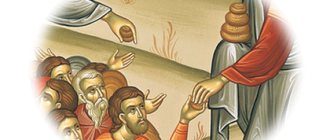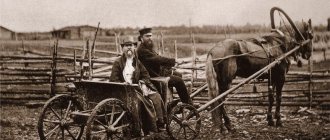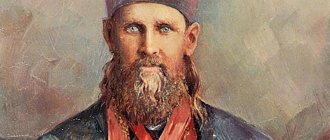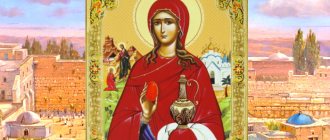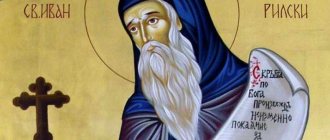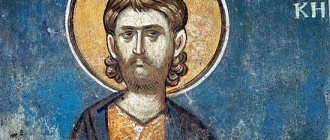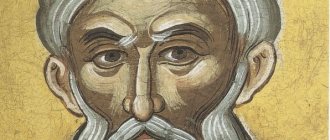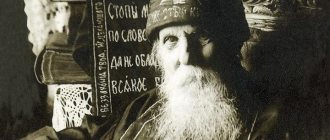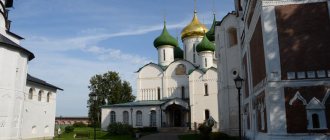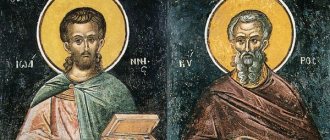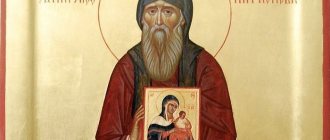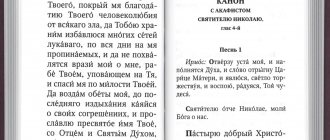Childhood and youth
John the Warrior was born in the 4th century. Unfortunately, the exact date of his birth is unknown. There is very little information about his life; he is rarely mentioned in chronicles. The man was originally from Constantinople.
The name John has Hebrew roots. It means “gift of God.”
John the Warrior in armor
Images of the saint were not common either in Byzantium or in the art of Rus'. Today, except for Russia, icons of John the Warrior are not found anywhere.
John is mostly depicted in armor, his hair is dark, and his face is framed by a beard. In his right hand he holds a cross - a sign of unshakable faith. A spear, a symbol of the fight against paganism, becomes a frequent attribute of the saint.
Veneration and significance in Orthodoxy
John the Russian earned deep lifetime respect and veneration not only from the Orthodox, but also from people of other faiths. The saint not only did not renounce the faith of his fathers, but throughout his life he set an example for all local Orthodox Christians and other captives.
The church honors St. John for setting an example of perseverance, unshakable faith in the Lord, humility and fortitude. The saint often repeated the words “Nothing can separate me from the love of Christ: neither sorrow, nor torment, nor fire...”. The Russian soldier carried Christ in his heart, observed Orthodox rituals, led a righteous life, which earned him the grace of God. In 1962, the Russian Orthodox Church was canonized in the person of the righteous; churches were built in honor of the saint in Russia and Ukraine. Memorial Day of John the Russian - June 9.
Christian feat
In those years, the ruler was Julian the Apostate. He was a cruel persecutor of Christians and dreamed of reviving paganism. Before him, his uncle Constantine the Great was in power; during the 40 years of his reign, not a single pagan temple remained in Constantinople. Therefore, Julian faced a very difficult task. Already in the first week after becoming sovereign, he decided to make a sacrifice in the Christian church in order to show the seriousness of his intentions.
Flavius Claudius Julian (Julian the Apostate)
That's when he received the nickname "Renegade." That’s what the blind old man called him; he said that Julian was an atheist, an apostate and a man without faith. But the ruler was adamant. He soon gathered numerous troops to expel the Christians.
He sent soldiers to all corners of the vast Roman Empire, giving them one single order: to destroy as many Christians as possible. John was one of Emperor Julian's soldiers. He was brave and courageous, and he was appointed to command the detachment. However, in his soul John remained a true Christian; the last thing he wanted was to cause pain and suffering to innocent people.
Icons of John the Warrior
Secretly, he warned Christian settlements about the movements of his troops. And most of them managed to escape at the time of his arrival. In the event that the soldiers did find someone in the village, John found an excuse to let the person go. Sometimes he even helped captured people escape from captivity.
Of course, this couldn't go on for long. John's detachment was dissatisfied with this behavior of the commander, so soon one of them reported to the emperor about his strange actions.
John the Warrior
When Julian found out about this, he ordered John to be brought to him. On the way, the soldiers mocked the man. They beat him and did not give him food or water. And when they entered the city, it turned out that the ruler had set out on a military campaign against the Persians. John was put in prison, where he had to await Julian's decision.
Shackled in iron, deprived of sunlight, John awaited his own execution. More than once he was overcome by doubts, but he was saved by prayer. In her he found support from God. Despite everything, the saint managed to avoid the bloodshed of his brothers while on duty and saved hundreds of lives.
One day, while praying, he heard the rattle of a lock. Of course, his first thought was that his time had come. But upon entering, the guard informed him that from now on he was free.
New Emperor Jovian
Julian the Apostate was mortally wounded during a military campaign, and the new emperor himself was a Christian and did not intend to kill his fellow believers. Thus, Julian became the last pagan emperor of Rome.
John believed that he was delivered through his tireless prayers to the Lord. For the rest of his life after his release, he helped the disadvantaged, outcasts of society. He tried to instill faith and hope in people. He shared both shelter and food with the poor.
Texts of prayers to John the Warrior
Troparion, tone 4
The All-Blessed God and the King/ the pious servant and warrior appeared to John the Wonderworker,/ having suffered courageously for the sake of the faith,/ having blissfully passed away,/ seeing the All-Creator Lord in Heaven oh brightest./ From Negozhe you receive the gift of miracles,/ you help suffering people in all sorts of misfortunes ,/ strengthen the warriors in the army,/ from the enemies of captivity, wounds and sudden deaths and from cruel misfortunes./ Moreover, pray to the Lord Christ, of ever-memory,/ that he may create in all circumstances mercy will be upon us,/ and will not lead us into temptation,// but He will save our souls, as He is the Lover of Mankind.
Translation: You became a faithful servant and warrior of the All-merciful God and King, John the Wonderworker, for you suffered courageously for your faith, and having blissfully completed your life’s journey, you contemplate the Creator of all, the Lord, in radiance in Heaven. Having received the gift of miracles from Him, you help suffering people in all sorts of temptations, strengthen soldiers in battles, deliver them from enemy captivity, wounds, sudden deaths and cruel misfortunes. Therefore, pray to the Lord Christ, always remembered, that in every calamity He will show us mercy and not lead us into temptation, but save our souls, as a Lover of mankind.
Troparion, tone 8
Having loved the bliss of the Gospel, O God-wise John,/ you honored the purity of your heart with virginity./ Moreover, you neglected the vanity of this world,/ you rushed to see God,/ who glorified you with miracles. in healing the variously afflicted./ For this reason we pray to you:/ we ask Christ the Lord for all kinds of the sorrows of deliverance // and the receipt of the Kingdom of Heaven.
Translation: Having loved the blessedness of the Gospel, God-wise John, you glorified the purity of your heart through virginity. Therefore, you rejected the vanity of this world, striving to contemplate God, Who glorified you with miracles in healing various suffering people. Therefore, we pray to you: “Ask Christ the Lord for deliverance from all sorrows and the receipt of the Kingdom of Heaven.”
Kontakion, tone 6
The pious warrior of Christ, / who defeated the enemies of soul and body with God-wisdom, / Let us duly praise John the martyr with songs, / working miracles, he gives abundant healing to the suffering people We/ and pray to the Lord God// to save the faithful from all troubles.
Translation: Let us honorably glorify the pious warrior of Christ, who defeated the enemies of soul and body with God's wisdom, John the Martyr through prayer chants, for he, performing miracles, gives abundant healing to suffering people and prays to the Lord God for the salvation of the Orthodox from all troubles.
Kontakion, voice 3
Sorrowful people find great joy in their troubles, O wonderworker John,/ you heal all passions for those who pray to you,/ fulfilling their requests./ Likewise, now pray to the Lord,// may He save us in His mercy.
Translation: You are a great joy for all people suffering in troubles, wonderworker John, for you heal all kinds of illnesses of those who pray to you, fulfilling their requests. Therefore, now pray to the Lord to save us by His mercy.
First prayer
Oh, martyr of Christ, John the warrior! Thou art brave in battle, and a chaser of the enemy, and an intercessor to the offended, to all Orthodox Christians. O great intercessor and servant of Christ, John the warrior! Have mercy on us, sinners and unworthy, and intercede in troubles and sorrows, and in sorrows and in every evil adversity, and from every evil and offending person, for such grace has been given to you from God, e Let us pray for us sinners in troubles and the misfortune of those who suffer evil. Deliver us from those who offend and hate, and be a strong champion for us against all our visible and invisible enemies. O great champion, John the warrior! Do not forget us, who always pray to you, asking for your help and your endless mercy, and grant us, sinners and unworthy, to receive from God the ineffable goodness that is prepared for those who love Him. For due Him is all glory, honor and worship, the Father and the Son and the Holy Spirit, now and forever, and to the ages of ages. Amen.
Second prayer
Oh, glorious saint of Christ, John the Warrior, you are the brave one in the battle, the driver of the enemy and the offended intercessor, the great intercessor and saint of Christ to all Orthodox Christians oh, remember us, sinful and unworthy slaves, in troubles, sorrows and sorrows, and in all kinds of evil adversity, and Protect us from every evil and offending person: for you have been given grace from God to pray for us sinners who suffer evil. Deliver us from those who offend us, be our champion strong against all our visible and invisible enemies, so that with your help and strong representation and struggle all those who show us evil will be put to shame! O great champion, John the Militant, do not forget us, sinners, praying to you and asking for your help and endless mercy, and grant us, sinful and unworthy servants, to receive from God unspeakable goodness, which is prepared for those who love Him, for all glory is due to Him, honor and worship to the Father, and the Son, and the Holy Spirit, now and ever and unto ages of ages. Amen.
Prayer three
Oh, glorious servant of Christ John the Warrior! You were a brave man in the army, a chaser of the enemy and an intercessor of the offended, but now you are a quick helper to all Orthodox Christians. Remember us, sinners and unworthy, and intercede for us in troubles and sorrows and sorrows and in every evil adversity, and protect us from every evil and offending person: for you have been given from God the grace to pray for us sinners (names), suffering evil. Oh, great champion of the enemy-driver, patron of the Christ-loving army and the offended intercessor, John the Warrior! Do not forget us sinners who pray to you and your help and endless mercy asking, and likewise we, sinners and unworthy, may receive ineffable goodness from God. For to Him belongs all glory, honor and worship, to the Father and the Son and the Holy Spirit, now and ever and unto the ages of ages.
Prayer four
Oh, Martyr of Christ John the Warrior! Brave in battle, and quick intercessor of Orthodox Christians in their troubles and misfortunes, by this grace from God! May our champion be strong against all our visible and invisible enemies. Grant victory to our army against our enemies, so that those who oppose us may humble themselves and come to their senses, and know the true God and His Holy Orthodox Church. Let us, sinners, be worthy to glorify the Lord our Savior in His Kingdom together with you forever. Amen.
( 3 ratings, average: 5.00 out of 5)
Death
The exact date of death of John the Warrior is unknown, but he died at a very old age. The man ordered to be buried in a cemetery for tramps. On the day of the burial, all the local poor came to say goodbye to the saint.
Over time, the burial site was forgotten. And then the holy martyr John himself appeared in a dream to one pious widow and told where his body rested. The next morning she immediately went there, and his incorrupt remains were found there. The relics were placed in a golden tomb in the Temple of Constantinople.
Church of St. John the Warrior on Yakimanka in Moscow
As the legend goes, shortly after these events, thieves broke into this woman’s house. She was already poor, but these people decided to take all her belongings from her. As they were leaving the house, something suddenly shone behind the men - it was a warrior in luminous armor. He ordered them to return the loot to the unfortunate widow and put everything back in its place.
The robbers were seriously scared, so they did everything as ordered. And the next day they came to this woman to ask for forgiveness for what they had done. The widow received them into the house, listened and forgave them. When they raised their heads, they saw that an icon depicting John the Warrior was hanging on the wall. Just the warrior who stopped them the day before. Since then, they have been praying to John the Warrior for the return of stolen things, and also asking the saint to pardon those who were imprisoned, being innocent and unjustly convicted.
Church of St. John the Warrior in Novokuznetsk
And this is far from the only case when a prayer or akathist to John the Warrior brings a miraculous solution to a problem. One day, a Persian carpet that was over 150 years old was stolen from a family. Frustrated people began to ask the holy martyr John for intercession. Soon a man knocked on their house with their carpet in his hands. He gave back the stolen goods and asked that a man in military uniform no longer come to him in his dreams.
The chronicle also describes the case that during the invasion of the Tatar army into Rus', the Tatars captured the Serpukhov convent. The barbarian, in a fit of anger and rage, began to chop down the icon of John the Warrior. Blood began to ooze from the boards. Before the eyes of those present, the sacred image was restored, and the invader believed in the Son of the Lord.
Brief biography of the saint
The holy righteous man became famous for his steadfastness of faith, humility, readiness for hard work, and renunciation of the blessings of life. The first miracles were performed by John during his lifetime. The captured soldier surprised the Turks with patience, calm dignity, and willingness to accept torture for the glory of Christ. Without loud words or teachings, John forced all the inhabitants of the Turkish village to respect him.
Origin
John was born into a family of Zaporozhye Cossacks in Little Russia in 1790. The parents were pious people and raised their son in the strong Orthodox faith. It was a difficult time - the south of Russia suffered from popular unrest, droughts and pestilence regularly occurred. John's parents were simple people, the boy fully experienced all the hardships and hardships of a poor existence.
Service in the royal army
John entered the army through conscription, having reached conscription age. The young man took part in the Prut campaign of Emperor Peter in 1711. The company failed, Peter almost died, thousands of Russian soldiers were captured by the Turks. John did not escape this fate either. After being captured, the Tatars brought John and other unfortunates to Constantinople and sold them into slavery to the Turks. The owner of the young soldier was a man who is called Aga in the life. The place of John’s slave service was the owner’s homeland - the village of Prokopion, which is now called Urgup (Turkey). According to the peace agreement concluded by Peter, the Turks did not return the prisoners.
Russian soldiers in captivity experienced beatings, torture, and humiliation. One could alleviate one's slavery situation by accepting Islam. Many agreed to this in order to save their lives.
John did not escape torment either. Prokopion was the headquarters of the Janissaries, distinguished by their particular cruelty and hatred of the Orthodox. John was demanded to renounce his faith. To induce apostasy, they drowned them in slurry, beat them, and burned off their hair and skin on their heads. Neither repeated torture nor promises of wealth broke the will of the captive.
Always meek and humble, John told Aga that he could take his head, but not believe that he was born a Christian and would die like that. The firmness of the captive forced Aga to retreat; he ordered him to perform his duties well, sending him to work in the stables.
John was an excellent worker; the horses greeted him with joyful neighs and offered him their heads for caresses. The soldier slept right in the stable, not at all embarrassed by his humble bed, because Christ came into the world in a manger. The saint spent most of the night in prayer and ate sparingly. Once a week I secretly went to the Church of St. George, located nearby.
Gradually, the grins and contempt of the Turks were replaced by respect for the calmness, strong will, goodwill and hard work of the Russian soldier. John's master began to grow rich and became one of the most respected residents of Prokopion, while Aga felt that he owed his well-being to the prayers of the saint.
Famous miracles
The saint worked all day and prayed tirelessly at night. The owners began to notice that after prayers the smell of horse manure went away, and the air in the stable was fragrant with a pleasant aroma. The envy of the other slaves did not offend John; he helped them in their work and shared their meager food.
Having become rich, Aga went to Mecca on Hajj to thank Allah for his help in his affairs. The host's relatives, who had gathered at this time, sat at a rich festive table, and John served them. The hostess, treating the guests to pilaf, regretted that Aga could not try her favorite food.
John asked for a dish of pilaf, saying that the owner would receive it in Mecca. Knowing that the Russian captive was feeding slaves and poor neighbors, the Turkish woman decided that the hungry would be treated to the pilaf and gave it to Ioanna. When Agha returned from Hajj, he brought home-cooked food. He told a wonderful story - in Mecca, he discovered a mountain of pilaf on well-known household dishes in a closed room when he returned from the mosque.
The Lord responded to the fervent prayers of St. John and performed a miracle. This story became known in the village and surrounding areas, and people started talking about the captive as a saint who had received the grace of God for his righteous life.
The end of life's journey
Respect and veneration did not change the saint. He continued to work in the stable, refused the comfortable accommodation offered by the owner, fasted and prayed tirelessly at night. Torment, years of captivity, and hard work exhausted the saint’s physical strength. He fell ill and took to his bed. Before his death, he asked to invite a priest for Communion. The Orthodox priest hid the Holy Gifts in an apple to hide it from Muslims. John the Russian died on May 27, 1730.
Aga allowed the slave to be buried according to Orthodox tradition, and donated the best carpet from the house. The saint was buried by all of Prokopion; the body was carried by Turks, Greeks, and Armenians. John rested in the Church of St. George, where he went to pray throughout the years of captivity.
The saint's grave immediately became a place of veneration for Orthodox Greeks. Those who turned to John the Russian for intercession were miraculously healed. The blind regained their sight, the paralyzed began to walk, the demon-possessed were freed from the unclean.
Important: Saint John answered the prayer requests not only of the Orthodox, but of everyone who asked for help.
Thousands of pilgrims from surrounding villages flocked to the grave. The priest of the Church of St. George, 3 years after the death of the saint, saw him in a dream. John told him that the Orthodox could find incorruptible relics. The priest’s doubts were dispelled when a pillar of bright light flashed over the grave. The grave was opened and the saint's body was removed. It smelled fragrant and remained incorruptible.
The relics were transferred to the temple for veneration. A few years later, Turkish troops tried to plunder the church and burn the relics. But the formidable figure of the saint appeared in the fire and drove the vandals out of the temple. The relics became smoky, but remained intact and did not lose their blessed power.
Information: the incorruptible remains of John the Russian were transferred to the large Church of Basil the Great, which was built in Prokopion. Some of the relics were honorably transferred to Athos.
